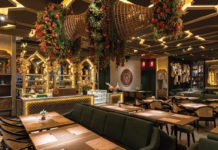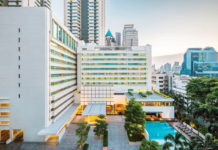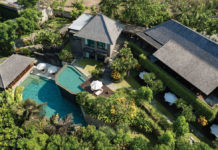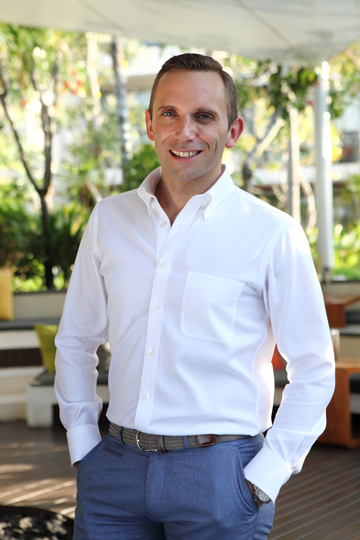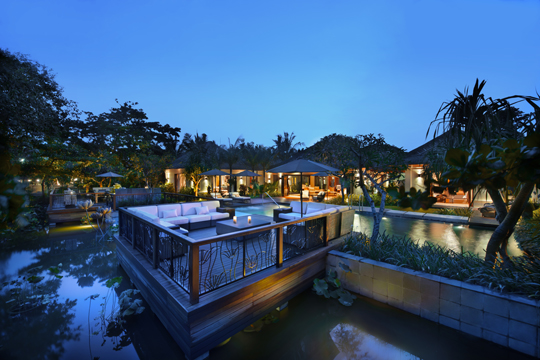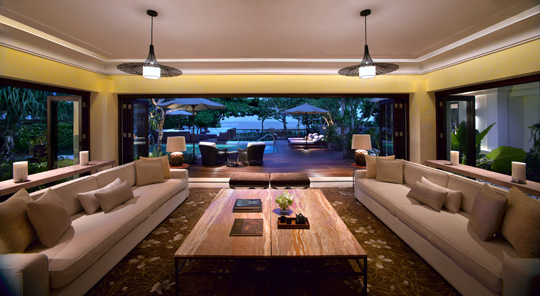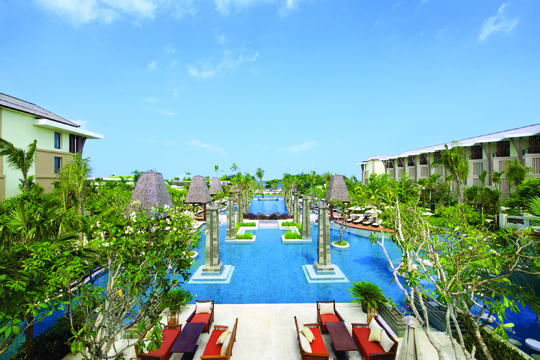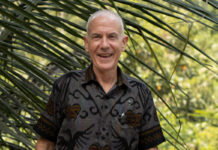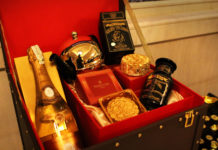This April, Frenchman Sylvain Pasdeloup took up the position as general manager of Sofitel Bali Nusa Dua Beach Resort, a French heritage-instilled five-star resort in the upscale Nusa Dua resort complex — Indonesia’s first Sofitel property (the French hotel group ACCOR’s most luxurious brand) and Bali’s only French luxury hotel brand. Prior to this prestigious General Manager position, Sylvain was hotel manager of this 415-room beachfront resort and part of the Sofitel Bali Nusa Dua pre-opening management team. He also brings to the table a successful track record and a wealth of experience, from food and beverages to operations, as well as a few hidden talents, managing a diverse range of markets throughout Europe, Australia and Asia with international luxury hotel brands. At age 33, this hospitality dynamo also happens to be one of the youngest hoteliers to be appointed to the most prestigious helm position at an international five-star resort. With Sylvain, there is nothing “lost in translation” here!
Q: How special is it to work in Indonesia’s first Sofitel property and Bali’s only French luxury hotel brand as a French-native general manager?
A: I’m from Toulouse, southwest France, so yes, it is pretty special, although I’ve enjoyed a long stint with French Sofitel properties worldwide for several years. I always had aspirations to be a general manager (GM), but it wasn’t a plan. I was hotel manager at Sofitel Bali Nusa Dua Beach Resort, plus with my prior hospitality background had plenty of experience and as part of the pre-opening management team I worked with Goran Aleks, the GM and personal friend, since the start.
When Goran left his GM position for Macau as ACCOR Vice President, Operations South China Luxury Upscale Brands and the opportunity arose for promotion, I took it. I’m delighted I got the opportunity and GM position I feel lucky doing a job I passionately love on a day-to-day basis; it’s fascinating and far from “clocking in, clocking out”. My background is actually more on the operational side, so I’ve discovered an unexpected new passion!
Q: How do you — and others — view your relatively young age as a newly installed GM? Do you see this as a positive and refreshing addition to this prestigious position?
A: I believe I’m Indonesia’s youngest general manager in a five-star and youngest for Sofitel Asia Pacific properties. This doesn’t worry me at all. I think it’s a positive factor. Besides, I always seem to be “young for the job,” such as the youngest F&B director in Australia. So far in my role as GM at Sofitel Bali Nusa Dua Beach Resort, the feedback from guests has been great, believing that the resort has a young and dynamic team. Actually, our team here offers a rounded balance of maturity and experience, all contributing something positive.
Q: Now that you are GM, how do you intend to make your mark at Sofitel Bali Nusa Dua Beach Resort and what plans and changes do you have in store for its continued success?
A: Sofitel Bali Nusa Dua Beach Resort is very exciting. There’s always something developing here and I’m never in my comfort zone. Around 18 months old, Sofitel Bali Nusa Dua Beach Resort is relatively young as a resort; it generally takes around three years to “stabilize” a hotel, so there’s a lot to accomplish. We have just opened a new wedding and events space, the “Jewel Box”: a stunning all-glass beachfront venue.
Weddings are a lucrative business in Bali and we have great potential for weddings in our resort, not just for our Australian and Japanese markets, but also for new emerging markets. I believe there are a lot of great new potential markets to explore, especially developing areas such as India and the Middle East; this is particularly so with the UAE, now that the Middle East-based airline Emirates has commenced daily flights to Bali direct from Dubai. (Sofitel Bali Nusa Dua Beach Resort hosted the launch event!) We are also developing long weekend escape packages for our domestic Indonesian guests — our leading market. As they are extremely social media savvy guests, this offers huge potential. We are also developing an all-inclusive lifestyle and sports membership programme with a French “art de vivre” concept (typical of Sofitel properties) for outside guests, overseen by a lifestyle concierge.
Q: With its authentic French flair and heritage, how does this and other elements make Sofitel Bali Nusa Dua Beach Resort a stand-out from the upscale Bali crowd?
A: Guests love our unique blend of French and Indonesian culture and service. In all Sofitel properties, staff greet guests in French (“Bonjour!” and “Bon Soir!” etc.), but here in Bali they also greet in both French and bahasa Indonesia — no one else does this! The resort is massive, but we are known for our personal touches and attention to the smallest of details. As a Sofitel hotel, Sofitel Bali Nusa Dua Beach Resort carries the brand’s signature French sophistication and French heritage, which we like to highlight. Thus there is an emphasis on culture and arts. And as an upscale French resort, a cultural link with French designer brands is important — we are planning fashion shows and events showcasing these world-class designers.
F&B is a major signature here and at all French Sofitel properties. High quality F&B options focus on catering to diverse guests’ global tastes. However, our in-house restaurants include a French bias, with our breakfasts and celebrated Weekend Brunch focusing on French favourites.
Q: Sofitel Bali Nusa Dua Beach Resort partially opened two months early to host part of the APEC Summit 2013; how significant was this APEC experience for the resort and what impact did it make on the subsequent events market?
A: I was part of the management team that planned and managed the APEC Summit 2013, hosted for the first time in Bali; we part-opened two months early in October 2013 solely to host some of this prestigious event — our new events facilities were recognised as superior. Sofitel Bali Nusa Dua Beach Resort hosted the president of Indonesia and 22 heads of state during the APEC Summit 2013.
Obviously, this was great exposure for us, successfully hosting a world event and showcasing our great facilities before opening, besides being officially endorsed by the Indonesian delegates — we accommodated the Indonesian president during the summit. Our team coped well with this operational challenge, gaining self-confidence from day one as host, with our exceptional facilities backing up our reputation.
Events amount to around 30 percent of business, with Indonesia our main market. We attract both corporate and leisure travellers, but aim more for social events and are increasingly evolving as a family resort.
Q: Do you think being part of the Sofitel Bali Nusa Dua Beach Resort pre-opening team helped you with the responsibilities that now go with being a GM at the same resort?
A: Yes! Actually, it helped that I have overseen the openings of two Sofitel properties. I was part of the pre-opening management team as executive assistant manager at Sofitel Mumbai Bandra Kurla, the ACCOR group’s first and flagship property in India. And at Sofitel Bali Nusa Dua Beach Resort, I was part of the pre-opening management team as hotel manager, from January 2013. This was quite an initial challenge as the resort was still a construction site and we had a deadline looming for hosting some of the APEC Summit 2013, for which we had to partially open, then close again, before officially opening in December 2013.Our team successfully managed the construction and opening of the property in less than a year — my operations experience helped a great deal. Actually opening for the APEC Summit 2013 in October gave our resort team a great advantage. If we are capable of pulling this off with our inexperience as a new resort, we are capable of anything! Despite the stress and challenges of hosting APEC before opening the resort, it was also fun and my team bonded incredibly well; in fact, it made the team stronger and created team loyalty.
Under these circumstances, normally staff would have quit, but since the resort opened, 99 percent of the team are still here! I’m lucky to have built up a strong team that is so dynamic and enthusiastic. After two and a half years at Sofitel Bali Nusa Dua Beach Resort, I am still learning.
However, being a hotel manager is different from a GM. There are new and different challenges and rather more responsibilities. A hotel manager tends to run the show from behind, while the GM is more exposed out front, assisting his team. Overall, being a hotel manager has been a natural progression to becoming the GM here, not only beneficial for my career, but also for the resort’s sense of continuity.
Q: You were instrumental in the development of Cut Catch Cucina’s brunch concept — now ranked as one of the world’s 10 Best Brunches by Conde Nast Traveler 2014. Is cuisine a passion and how did you get involved with this?
A: Yes, cuisine is a big passion of mine: My Diploma in Hospitality Management in 2001 at Lycée Hôtelier of Occitanie, Toulouse, France, incorporated cooking, plus I was assistant F&B manager at Hyatt Regency Paris CDG, France and Sofitel Jin Jiang Oriental, China and director of food and beverages at Sofitel Brisbane Central and Sofitel Gold Coast, Australia. Here at SBNDBR, I have worked closely with our Australian chef who is also passionate about cuisine.
When I arrived in Bali I noticed there were not so many Sunday brunches hosted on the island and different style brunches offered huge potential. We decided to work on a new-concept brunch, essentially with a French food and flair focus. As hotel manager, I got involved in research, food presentation and food tasting. Launched in Cut Catch Cucina, this celebrated Sunday Brunch became so popular it’s now also on Saturdays, the only Bali brunch hosted on both weekend days. Recognized by Conde Nast Traveler as one of the best 10 brunches worldwide, I’m even more proud — especially as we were up against some major established properties.
Q: How do you find the lifestyle in Bali and how does it compare from previous hospitality roles in India and China?
A: You learn to adapt to wherever you are. India and China are in their own ways both challenging professionally — very different from Bali. I find Bali has a special and unique aura. It’s quite relaxed and difficult to get angry or upset here. Even though I’m essentially a city person, Bali is my dream destination; I’ve long been familiar with the island, flying in from wherever I was working, for holidays every few years before 2003. I love the warmth of the people, food, environment and strong cultural identity. For me, both professionally and personally, Bali is “flavour of the year” for the next few years.
www.sofitel.com.




